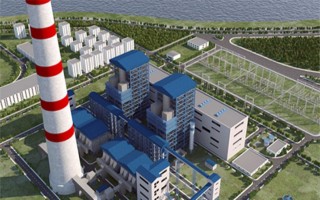Amid severe protests from environmentalists and political activists, Bangladesh-India Friendship Power Company on Monday ordered the construction work for 1,320MW coal-fired power plant at Rampal, only 14km off the Sunderbans.
The construction phase of two units (660MW each) of Maitree Super Thermal Power Plant began on Tuesday with a target of commissioning of the power plant by 2020, an official of the friendship company said.
On Monday, the friendship company, a 50-50 joint venture of Bangladesh Power Development Board and India’s National Thermal Power Corporation, issued the notice to proceed to Indian state-run Bharat Heavy Electricals Limited, the contractor for engineering, procurement and construction of the power plant, he said.
Earlier on the day, the friendship company and the contractor held a meeting in Dhaka, the official said.
Bharat Heavy Electricals will soon mobilise capital machinery and manpower to Rampal as the project site is ready for the construction, he said.
According to the contract, the first unit of the power plant with 660MW capacity will be commissioned in 41 months counting from Tuesday while the second unit with the same capacity will be commissioned six months later.
The decision of the friendship company came in two weeks after the friendship company and India’s EXIM Bank signed an agreement for $1.6 billion for the construction of the power plant. The agreement was signed on April 10 during prime minister Sheikh Hasina’s state visit to New Delhi.
The entire project cost was estimated $2 billion while Bharat Heavy Electricals would receive $1.49 billion for its job, said officials.
Major political forces and green activists have been opposing the project, saying that it would affect the world’s largest mangrove forest.
At a roundtable on the potential impacts of the coal-fired power plant on the livelihoods in the Sunderbans’ ecosystem on April 22, leaders of different political parties and individual think tanks said that politicians irrespective of ideologies should stand united against the government’s ‘adamant attitude’ about the project as it was a national concern.
They alleged that the ruling Awami League was implementing the project despite protests to please the Indian government.
UNESCO also requested the government twice in the past year to relocate the power plant from the proximity of the Suderbans so that the plant’s emission and coal transportation could not affect the biodiversity of the world heritage site.
On October 18, 2016, ENESCO also threatened to place the Sunderbans on the list of ‘World Heritage in Danger’ in 2017.
The government, however, denied that the power plant would leave any adverse impact on the Sunderbans.
The construction phase of two units (660MW each) of Maitree Super Thermal Power Plant began on Tuesday with a target of commissioning of the power plant by 2020, an official of the friendship company said.
On Monday, the friendship company, a 50-50 joint venture of Bangladesh Power Development Board and India’s National Thermal Power Corporation, issued the notice to proceed to Indian state-run Bharat Heavy Electricals Limited, the contractor for engineering, procurement and construction of the power plant, he said.
Earlier on the day, the friendship company and the contractor held a meeting in Dhaka, the official said.
Bharat Heavy Electricals will soon mobilise capital machinery and manpower to Rampal as the project site is ready for the construction, he said.
According to the contract, the first unit of the power plant with 660MW capacity will be commissioned in 41 months counting from Tuesday while the second unit with the same capacity will be commissioned six months later.
The decision of the friendship company came in two weeks after the friendship company and India’s EXIM Bank signed an agreement for $1.6 billion for the construction of the power plant. The agreement was signed on April 10 during prime minister Sheikh Hasina’s state visit to New Delhi.
The entire project cost was estimated $2 billion while Bharat Heavy Electricals would receive $1.49 billion for its job, said officials.
Major political forces and green activists have been opposing the project, saying that it would affect the world’s largest mangrove forest.
At a roundtable on the potential impacts of the coal-fired power plant on the livelihoods in the Sunderbans’ ecosystem on April 22, leaders of different political parties and individual think tanks said that politicians irrespective of ideologies should stand united against the government’s ‘adamant attitude’ about the project as it was a national concern.
They alleged that the ruling Awami League was implementing the project despite protests to please the Indian government.
UNESCO also requested the government twice in the past year to relocate the power plant from the proximity of the Suderbans so that the plant’s emission and coal transportation could not affect the biodiversity of the world heritage site.
On October 18, 2016, ENESCO also threatened to place the Sunderbans on the list of ‘World Heritage in Danger’ in 2017.
The government, however, denied that the power plant would leave any adverse impact on the Sunderbans.
Source: New Age










